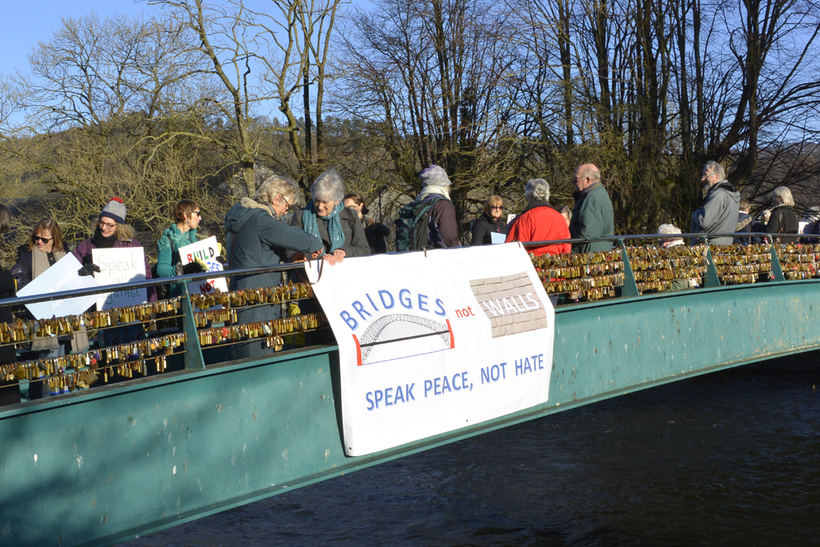Speaking out against discrimination and injustice
Quakers oppose all acts of government which discriminate against people because of who they are or where they were born. Sue Hepworth explains where this conviction began for her.

I first heard of refugees in the late 1950s in Derby Children's Meeting, when we made hussifs to send to a refugee camp. Then in 1960, World Refugee Year, three school friends and I knitted a blanket to send. Skip forward 35 years to the Bosnian war when I saw a picture of displaced women and children on a hill behind a razor wire fence. Domestic detritus was strewn across the border – a shoe, a broken pushchair, a doll. I was unbearably moved.
In December 2014 I was cooking tea in my cosy kitchen when I heard a news bulletin which said there were 4 million Syrian refugees, many of whom were orphaned children. Again I was moved to tears. The following spring, after a wonderful sunny day spent on a narrowboat, I heard how a refugee boat had sunk in the Mediterranean, with hundreds of people drowned. It was shocking, but what shocked me more was David Cameron's heartless decision to scale back the rescue operation in order to deter other desperate people from making a similar journey.
A basic human response
Since then, refugees have been constantly on my mind: it is a basic human response, though the testimonies of social justice, peace, equality and community are relevant.
At the end of 2016 I read online about a movement called 'Bridges Not Walls', begun by a Hastings homeless shelter worker after Donald Trump was elected as US president.
I suggested to my local Quaker meeting in Bakewell that we play our part by dropping a banner from the bridge in Bakewell on Trump's inauguration day. Friends at Meeting were enthusiastic, but there were only ten days between their agreeing we should join and inauguration day.
With no time or energy to make the gorgeous fabric banner which I'd envisaged, my husband and I designed one and had it printed, and wrote anti-racist slogans on the back of our peace placards.
We invited other Bakewell churches to join us, and I sent out a press release. The result was reports and photographs in the Derbyshire Times, and Matlock Mercury, an interview on BBC Radio Derby and a late night snippet on BBC East Midlands Today. One Bakewell Friend also made a video of the event.
Building bridges across the world
On 20 January the sun shone after a week of dank mist. There were 47 people with us over the two hour stretch, which is pretty wonderful for a small rural market town in England in January. More importantly it made us feel in our own small way, part of a movement that is growing and strengthening, building bridges across the world.
Since then I have written to Theresa May and my MP to object to Trump's state visit, signed a petition against it, and written again about the trashing of the Dubs amendment, which should have allowed 3000 unaccompanied children safe passage to Britain, but may be abandoned after helping only 350.
Friends will keep speaking out against discrimination and injustice wherever they encounter it, especially as it deepens in the context of the current US administration and the rise of racism across Europe.
I will be one of those Friends.